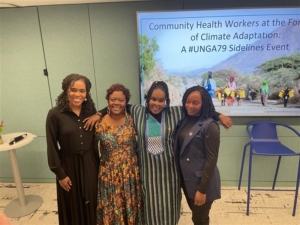 Alongside the 79th session of the United Nations General Assembly, Last Mile Health hosted a side event, “Community health workers at the forefront of climate adaptation,” in partnership with Macquarie Group Foundation and Johnson & Johnson.
Alongside the 79th session of the United Nations General Assembly, Last Mile Health hosted a side event, “Community health workers at the forefront of climate adaptation,” in partnership with Macquarie Group Foundation and Johnson & Johnson.
Strong, integrated community health programs are an essential tool to help vulnerable communities adapt to the health impacts of a changing climate. The side event featured stories from professional community health workers as well as reflections and discussion from health systems leaders on how best to equip community health workers to respond to the health impacts of a changing climate.
Watch the full event
Participants heard first from community health workers Margaret Odera, Ramatu Jalloh, and Bupe Sinkala, who shared personal stories about their experience serving communities in the midst of a changing climate. They offered insights into the increased incidence of flooding, the growing burden of malaria, the threats of malnutrition from drought, and the spread of cholera in their communities.
“What do I want you to know? I want you to know that community health workers are human beings with our own families’ needs, traumas, and stories. It makes us very strong in what we do, but also means that we need support. Community health workers need better salaries, training so that we can keep pursuing long good health and power to our community. Natural disasters only make our communities more desperate for support that only community health workers can provide.” – Margaret Odera, community health worker, Kenya
“Back home, [we have] a cholera outbreak, which is caused by heavy floods and this has mixed with the drinking water. You ask some of your clients to wash their hands, and the water is not even enough for you to do the same as a healthcare worker. We are also experiencing drought, and this has made good nutrition hard to find and expensive. It is definitely clear that the climate crisis is a health crisis.” – Bupe Sinkala, Community Health Worker, Zambia
We were galvanized by the calls to action from the community health workers and from health systems leaders Dr. Vanessa Kerry, T. Ruston Yarnko, Dr. Johanna Sanchez, and Dr. Sara Bender. They emphasized the need for locally led solutions and investments at the intersection of climate and health. Last Mile Health CEO Lisha McCormick closed the event, encouraging us all to “consider health investments through a climate lens and climate investments through a health lens—but above all, to keep investing.”




